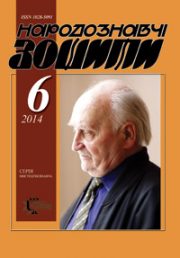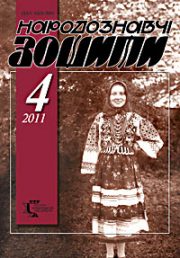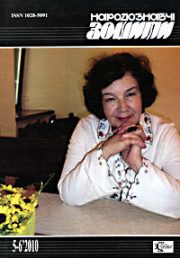The Ethnology Notebooks. 2021. # 1 (157), P. 19—27
УДК 801.81:17.0221]:325.83.(477.82)”1940/1960″
DOI https://doi.org/10.15407/nz2021.01.019
Мaryna DEMEDYUK
- ORCID ID: https://orcid.org/0000-0003-4415-002X
- Candidate of philological sciences (= Ph. D. in philology),
- Researcher at the Institute of Ethnology
- of the National Academy of Sciences of Ukraine,
- Department of Folklor Studies,
- 15 Svobody Avenue, 79000, Lviv, Ukraine,
- e-mail: mdemedyuk@gmail.com
The article substantiates the relevance of the study of folk narratives using a value approach. Key axiological guidelines are considered, which capture the most important aspect of human existence, its ability to transform the world and itself according to significant value criteria. It has found that values vary depending on the historical epoch, the environment, but they form the basis of human activity, as well as social relations. The purpose is to clarify the specificity and transformation of values during the Second World War, which is actualized in the dichotomous concepts of good and evil, moral autonomy, responsibility and moral authority. The object of the study is the folklore narratives of Volyn Polissya, and the subject — the reflection in the texts of values in wartime. The methodological basis of the work is the principles of objectivity and historicism of folklore, and the main methods are structural-typological, the method of conceptual analysis. The elaborations of the problem of value characteristics in the folklore texts, presented in the publications of philosophical and psychological problems (N. Godz, O. Stasevska, L. Khalyuk, S. Gorbatyuk, etc.) are used. It is emphasized that in recent years, in connection with the expansion of the subject field of oral science, the problem is relevant in the focus of folklore developments (works of Y. Garasim, O. Ivanovskaya, N. Yarmolenko, L. Mushketyk).
Based on the analysis of narrative texts, it have found that the main ideas for the events of 40—60 AD in Western Ukraine are the ideas of good/evil, happiness/misery, the value of human life and memory of the dead, etc. The article proved that the desire to do good things and see the positive even in the enemy is a productive motive in modern narratives. The value of human life, which interpreted regardless of age, gender or ethnicity, is also of undeniable importance. Happiness in narratives considered synonymously with the concept of peaceful life, being without war, which must be valued and protected. Motives of loyalty to duty, comrades, and marital honesty are gaining popularity in the narratives of rebel struggle and recruitment. Betrayal interpreted as an act of dishonor that can only neutralized by the price of blood.
Keywords: values, axiological landmarks, folklore text, narratives, war, ambivalent character.
REFERENCES
- Kononenko, V. (2004). Concepts of Ukrainian discourse. Monograph. Kyiv-Ivano-Frankivsk: Play [in Ukrainian].
- Stasevskaya, O.E. (2017). Spiritual values and socio-cultural identity: the problem of interdependence. In Bulletin of the Yaroslav the Wise National Law University. Series philosophy, philosophy of law, political science, sociology, 3, 113—122. Kyiv [in Ukrainian].
- Garasym, Y. (2010). National identity of the aesthetics of Ukrainian song folklore. Lviv: Scientific and Production Enterprise «Ukrainian Technologies» [in Ukrainian].
- Ivanovska, O. (2012). Ukrainian folklore: semantics and pragmatics of traditional meanings: textbook for students folklorist and philol. special higher textbook lock. Kyiv: Express-Polygraph [in Ukrainian].
- Yarmolenko, N. (2010). Ukrainian oral heroic epic: the dynamics of tradition: a monograph. Kyiv [in Ukrainian].
- Mushketyk, L. (2019). Higher Sophia values and the dialectic of good and evil in the oral text. International Conference «Folklore — a strategic resource of the nation». In Folklore readings dedicated to Professor Lydia Dunaevskaya. (Abstracts) (Pp. 94—95). Kyiv [in Ukrainian].
- Khalyuk, L. (2019). Oral narratives as a folklore source on the history of the Ukrainian population of Poland in 1947. In International Conference «Folklore — a strategic resource of the nation». Folklore readings dedicated to Professor Lydia Dunaevskaya. (Abstracts) (Pp. 122—124). Kyiv [in Ukrainian].
- Gritsa, S. (1994). Endogenous nature of folklore. Philosophical and sociological thought, 7—8, 62—73 [in Ukrainian].
- Razumtseva, G.I. (2004). Moral and ethical views of the Ukrainian people on folklore sources: axiological aspect. The thesis for the academic degree of Candidate of Historical Sciences with a specialization in Philosophy. Kyiv [in Ukrainian].
- Khalyuk, L. (2013). Oral folk tales of Ukrainian immigrants Lemkivshchyna, Kholmshchyna, Podlasie and Nadsyannia: genre-thematic specifics, artistic features. Kyiv [in Ukrainian].
- Savchin, M. (2014). Spiritual identity as a defining characteristic of a perfect personality. Scientific notes of the National University «Ostroh Academy». Series: Psychology and pedagogy (Issue 27, pp. 112—118). Retrieved from: http://nbuv.gov.ua/UJRN/Nznuoapp_2014_27_29 (Last accessed: 19.12.2020) [in Ukrainian].
- Matyukhina, O.A. (2013). Life as the highest value of life — the leading idea of the philosophy of Albert Schweitzer. In Bulletin of the National Aviation University. Philosophy. Culturology, 2, 47—51. Retrieved from: http://nbuv.gov.ua/UJRN/Vnau_f_2013_2_12 (Last accessed: 19.12.2020) [in Ukrainian].
- Lossky, N. (1931). Value and being. God and the Kingdom of God as the basis of values. Paris. Retrieved from: http://psylib.org.ua/books/lossn01/index.htm (Last accessed: 19.12.2020) [in Russian].
- Schweizer, A. Culture and ethics. Retrieved from: https://royallib.com/read/shveytser_albert/kultura_i_etika.html#0 (Last accessed: 19.12.2020) [in Ukrainian].
- Scrypnyk, A.I. (2006). Educational potential of political values. Intelligentsia and power. Series: History (Issue 6, pp. 207—212). Retrieved from: http://nbuv.gov.ua/UJRN/iiv_2006_6_29 (Last accessed: 19.12.2020).
- Sviridenko, I.M. (2008). Theoretical aspects of the phenomenon of «loyalty». In Theoretical and methodological problems of education of children and student youth: materials of the All-Ukrainian scientific-practical conference: coll. Science; Academy of Pedagogical Sciences of Ukraine, Institute of Education Problems, (Pp. 390—397). Rzytomyr [in Ukrainian].
- Nietzsche, F. (2005). So said Zarathustra: A book for everyone and for no one. Moscow: Martin [in Russian].







